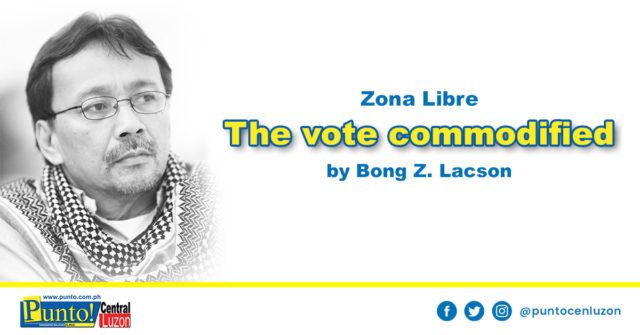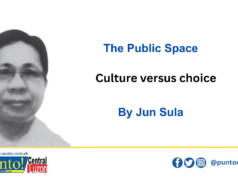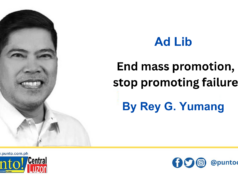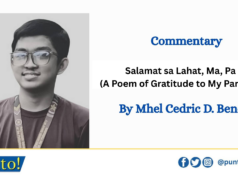IT IS still six months to the 2019 polls and already, one candidate – I need not tell you who, in a city – I need not tell you which, is assessed to have spent, as of mid-November yet, some P70 million.
A virtual exodus – that’s how a neighbor puts it – of the magnitude of Cecil B. DeMille’s The Ten Commandments is showing daily at the upscale enclave where the candidate’s high-walled estate miraculously opened up as one promised land, luring the multitude to the manna for easy picking there.
For the Christmas season alone, friends swear to the heavens, the candidate will give Santa a run for his gifts with a budget of P30 million.
Apprised of the wannabe’s colossal campaign chest, the hanger-on reportedly bragged of P300 million at his disposal. To which, scoff ed those in-the-know: Ninanu ya? Maluat nong megisan qng pamaniali nang gabun ding penaco-quitan na. (Crude translation: What money? That he amassed from his grafting has long been spent in his personal land-banking).
Already gargantuan, those hundreds of millions of pesos allotted for a city campaign readily diminish to Lilliputian pittance vis-à-vis the Brobdingnagian P1 billion plus-plus bruited about as the campaign treasury the ambitious needs for a provincial run.
The ready assumption is that such astronomical sum could only come from congressional pork. But with the sitting congressmen smug with their expected coronation in their respective districts, the hunt shifts to… cholesterol pork?
Yes, P1 billion can be exacted from the piggy bank. But only from that little piggy that went to and dominated the market, turning out the province’s best.
If meatheads are to be believed, the P1-B++ campaign has already started in the riverine villages of Masantol and Macabebe with the sudden engagement of just about every sarisari store in dealership of processed meat products bearing the brand and colors, not to mention the picture the greater Kapampangan carnivores are most familiar with.
As much for cold cash, as for cold cuts – especially this Christmastime – the 2019 election campaign will be enjoyed. Whatever, constant shall remain the commercialization of the vote. As I wrote about in campaigns past, updated to wit:
AN HONEST politician is one who, when bought, will stay bought.
Substitute “voter” for politician, and still holds that truism attributed to the American financier and politician Simon Cameron (1799-1889) who served a short year as Lincoln’s Secretary of War, deposed for corruption.
A caveat emptor though is necessary here: What is the warranty given the buyer that whom he/she bought stayed “honest” all the way to the poll precinct?
This becomes all too problematic given the exhortations of moralists: Kunin ang pera, sundin ang konsiyensiya! Kunin ang pera, iboto ang kursunada!
To get their money’s worth, what politicians and their strategists did in the business of vote-buying in manual elections past was to provide carbon paper – along with half of the pay – to the payee which he/she was required to sandwich between the ballot and a piece of paper. That paper was to be presented to the “coordinator” of the payer for the other half of the agreed-upon price for the vote.
Technology upgraded voting with the precinct count optical scan (PCOS) machines. So was the carbon paper upgraded to the cell phone. The payee now required to take a photo of his accomplished ballot with his mobile to prove that he/she did his/her part of the bargain. (That was before mobiles were banned from the precincts).
Pre-election buying of votes has even less guarantees of “honest” returns. If a voter can sell his/her vote to one candidate, what prevents him/her to sell it to the rival candidate? As there are double deals in government contracts for so-called SOPs, so there are double sales in votes.
Indeed, long and loud are the lamentations of losing candidates over the waste of so much money on voters who just (re)sold out to the higher bidder.
Wise to the ways of “dishonest” voters, a local candidate in the 2010 elections was reported to have corralled the voters that were purchased 30 hours before the elections, providing them with food and accommodations as well as bags of goodies, thereby preventing them from being bought back by the rival.
Before the precincts opened, the quartered voters were herded like sheep to their respected polling places.
Thus, the dictum: Secure, hide what you have purchased, lest they be stolen from you.
In the 2013 campaign, vote-buying is said to have taken a different turn. Voters are now asked, in exchange for cash, not anymore to vote for a certain candidate but not to vote at all.
A candidate knows the bailiwicks of his/her opponent. It is there that money is widely spent on the rival’s supporters for them not to bother voting anymore. Just to be sure that their money is spent wisely and the bought voter stayed honest, indelible ink shall be put on his/ her forefinger on election day.
In one town, it is said that the going rate for the no-voter at this early is already P1,500.
That’s quite a sum compared to the paltry P300 per vote bandied about in the city. Which reminds me of the now lamented, dearly departed Tirso G. Lacanilao, three-term mayor of Apalit.
Campaigning for his second and last reelection, Lacanilao lambasted – on stage – voters who commodified their ballots thus: Mababa ko pa uri kesa karing babi. King P300 pisali yu pati kaladuwa yu. Ing babi halaga ne man libu-libo.(You have lesser value than pigs. For P300 you sold your very souls. The pig costs thousands of pesos at least).”
Shame before swine. Awfully shameless.
A consolation for those who don’t buy, who can’t buy, who won’t buy votes: One can only buy so much.
In a tight contest though, that so much can be more than enough to make the difference. Yeah, there’s a bargain sale out there.





